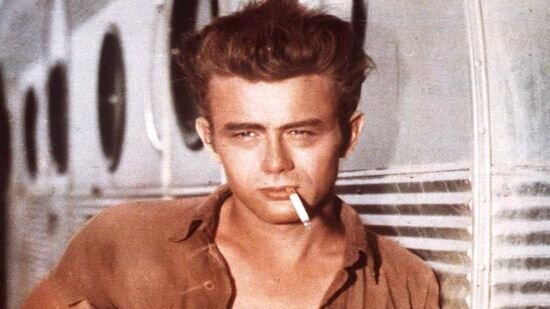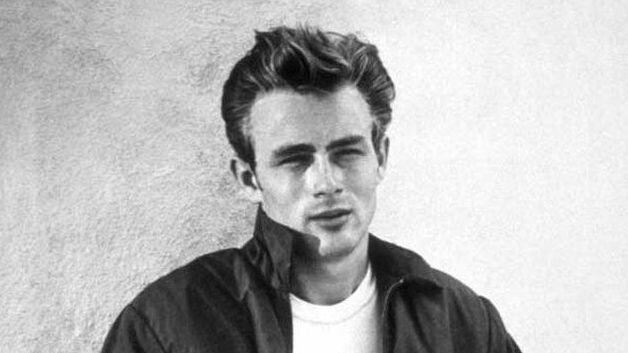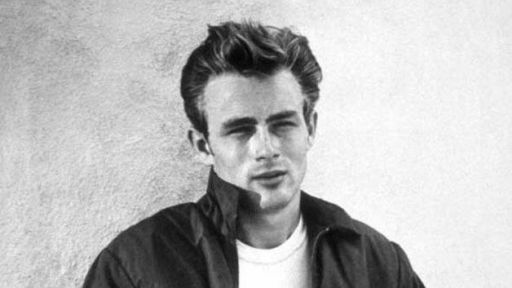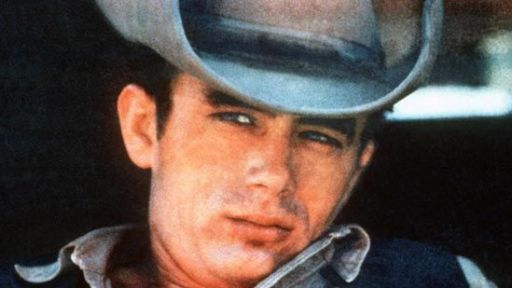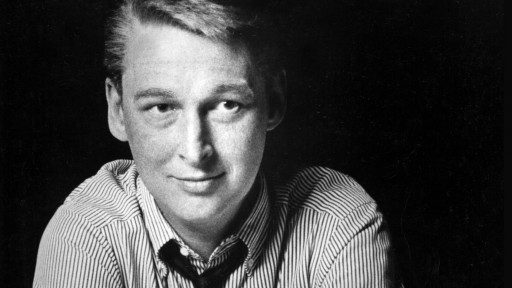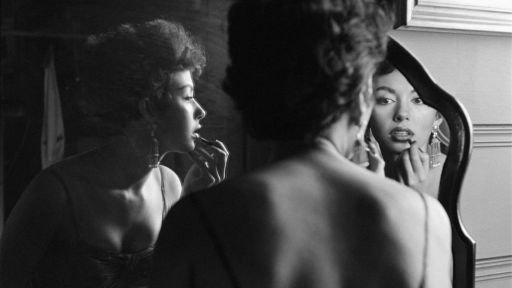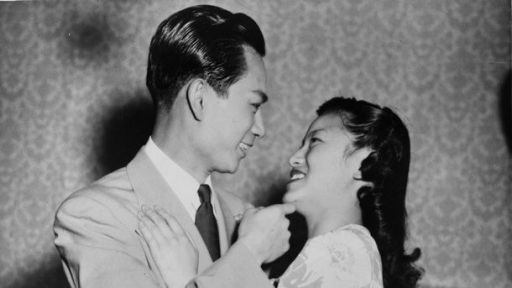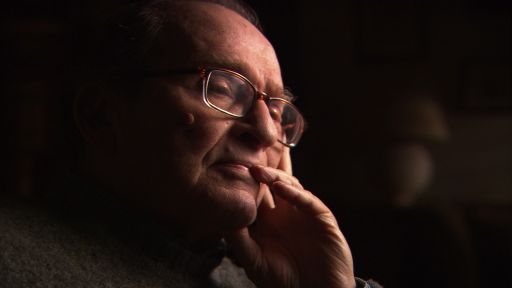American Masters interviewed JAMES DEAN: SENSE MEMORIES filmmaker Gail Levin on making a film about the actor’s life and career.
American Masters: What got you interested in this project? What drew you to James Dean?
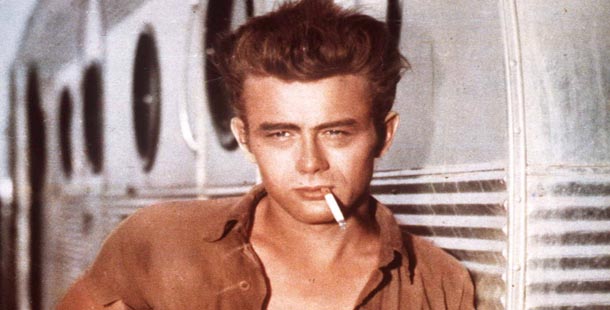 Gail Levin: Interestingly enough, there is a sort of circular story to this film. There is a very famous photograph of James Dean taken in Times Square in 1955. He is walking in the rain, cigarette dangling from his lips, the beauty of 1950’s New York in varying shades of black and grey — foggy, misty and utterly compelling — in short a perfect picture… perfect composition, perfect subject, perfect era, perfect mood. I first saw this photograph at some point when I was in college and noticed that the photographer was Dennis Stock.
Gail Levin: Interestingly enough, there is a sort of circular story to this film. There is a very famous photograph of James Dean taken in Times Square in 1955. He is walking in the rain, cigarette dangling from his lips, the beauty of 1950’s New York in varying shades of black and grey — foggy, misty and utterly compelling — in short a perfect picture… perfect composition, perfect subject, perfect era, perfect mood. I first saw this photograph at some point when I was in college and noticed that the photographer was Dennis Stock.
Instantaneously I fell completely in love with the whole thing — with photography first and foremost, with the time, with James Dean, etc… and, of course, I wanted to know Dennis Stock.
Years passed and in 2000 I had the opportunity to make the film MAKING THE MISFITS for Great Performances. That film involved the great photographers from the prestigious photo agency Magnum, of which Dennis is a member. At last I met him… and Dennis Stock has become my dear friend.
At the beginning of 2004 Dennis phoned me to tell me of the 50th anniversary of Dean’s death, September 30, 2005 and to suggest that much would be done to commemorate this anniversary and that we should make a film. And of course a centerpiece to this film is Dennis and that ever popular photograph of Dean in Times Square. T here is something to that symmetry which thrills me — that something/someone that so excited me in so innocent a way, has come full circle and become a subject that I am entrusted with in making a film.
Another aspect of the story of Dean I found quite compelling is that unlike others he may be compared with — Marilyn Monroe, Marlon Brando, etc. — he managed to achieve legendary status with only three films, EAST OF EDEN, REBEL WITHOUT A CAUSE, and GIANT. And within essentially an 18 month period, with primary emphasis on the year 1955. He died at the age of 24, saw only one of those films released — ironically the film most identified with him, REBEL, had not yet been released at the time of his death — and within that very short trajectory Dean is still a force today. Marilyn Monroe, conversely, died at the age of 37 and had many more films to her credit, so Dean’s rise is unparalleled.
AM: Tell us about the title SENSE MEMORIES.
GL: I saw a book of essays by the German filmmaker Wim Wenders titled EMOTION PICTURES and it struck a very responsive chord in me with regard to James Dean and our film. This film is not a traditional biography with a traditional chronology… in fact it inhabits its own ethos, so to speak. It is interpretive, impressionistic, a “rashoman” of sorts, a collection of memories and moments — in the vein of “emotion pictures.” And the title is also meant to evoke the concept of the “method” in acting, drawing on memory, drawing on life experience to inform a part or a role. Though Dean was a member of the Actor’s Studio and at the time the youngest person ever invited in, he was really sort of the original method man — everything about him invoked his past, his own personal drama, his own angst. And so, this title, SENSE MEMORIES, means just that… something sensual, sensitive, even a bit sentimental and of its own sense.
AM: Did you learn anything that surprised you about Dean while making this film?
GL: I don’t know that anything surprised me, but certain things have impressed me…
Dean was on his way to becoming an extraordinary actor, this had somehow not been explored before. He was a gorgeous creature completely alluring to both men and women and, I felt, quite ahead of his time in his tone and his look. Though often compared to Brando and very propelled by Brando himself, his attraction, energy, even talent was really something quite different. He himself is rumored to have said that on one hand he embodied Brando saying “screw you,” and on the other hand he evoked another great actor of the time, Montgomery Clift, saying “help me…”
There is no doubt he was a combination of both — vulnerable and threatening, sweet and suspicious, hot and cool.
But he took his acting chops seriously and though twitchy and probably off-putting in certain instances, his dedication to his craft was unquestionable. And this aspect of Dean has been, to my mind, quite overlooked. It is also what makes him very deserving as a subject for AMERICAN MASTERS.
AM: Are there any interesting anecdotes about the filming or, interviewees?
GL: First, I must point out that every single person in this film had a direct link to Dean and knew him personally. And, although I don’t know that this is anecdotal, a very present subtext in this film is that it is in fact fifty, count them, fifty years later. And while Dean is frozen in time, the others are not. It was quite arresting, for example, to meet Corey Allen, the robust, defiant “Buzz” of REBEL WITHOUT A CAUSE, and to see him with Parkinson’s disease… others visibly suffered other ailments.
However, they were also all quite accomplished,and all represent the triumph and true magnificence of life. And all also represent the extraordinary range of people who surrounded Dean, long before any of them were yet who they would become — including Dean. Each consummate in their own way, everyone in this film is exceptional, and everyone went on to achieve a certain greatness.
I would also like to make the point, that everything is first hand memory and that rather than think of these people as interviewees, I would rather consider them the characters of this film, of Dean’s life… they played a certain role in his life and I would like to think of them the same way in this film. They populate this film as real personalities not merely as interviews. If this were a feature, for example, someone might play the part of Martin Landau… here Martin Landau is himself.
AM: Could you describe the production process, anything about how you chose to shoot the film?
GL: Actually this is a very deliberate film in terms of our process. I worked extremely closely with the director of photography, Dewald Aukema, to achieve a very specific look and feel for the film. It was our desire to make the look for the “characters” very bold. We wanted to essentially de-saturate the color — almost to black & white, but not quite — just a tinge of hue in the shots. This is also to stay close to the feeling of the black & white photographs and also to remain close to the era — 1955… because the entire film is set in that year we wanted to make it very evocative all round.
Then the film clips, the archive footage from Warner Bros, our original footage is in color… and again, this to separate the man, the intimate side of the story telling, from the art, the films, the acting.
AM: What do you think is Deans legacy? Is he as influential now as he ever was?
GL: Perhaps it is a certain androgyny which Dean evokes that makes him so modern, so palpable, so timeless. Aside from his work, his image, his sultry brooding, his hot/cool edge remains inimitable. He came at just the right moment… informed an age with an aura at exactly the point he was needed and then just as immediately was gone. This is very powerful! He is forever young, beautiful, pained, brilliant, impossible, endlessly seductive… and he delivered three exceptional performances, so that adds to it as well. All three of his films remain in the public consciousness, particularly REBEL and GIANT and he has that seeming casual-ness that is forever in fashion — that seemingly heedless courage that is somehow eternal.
AM: What do you want viewers to take away from the film?
GL: I hope the audience will visit Dean in a new way… for those who don’t know of him, my hope is that they will be enticed to want to know more… more than just that indelible image. And for those who think nothing new can be derived from this subject, I hope they will feel this film a fresh look at an old story — a view of Dean that actually achieves something else and reveals a real original, the rarest and most sacred of characteristics…

